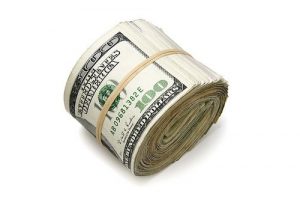 Much digital ink has been spilled over the past several months discussing the salary wars that are currently taking place among many Biglaw firms. Indeed, dozens of the most prestigious firms in the nation have recently raised associate salaries for the first time in over… two years. This is big news, and many attorneys at these firms are justifiably happy with these pay raises.
Much digital ink has been spilled over the past several months discussing the salary wars that are currently taking place among many Biglaw firms. Indeed, dozens of the most prestigious firms in the nation have recently raised associate salaries for the first time in over… two years. This is big news, and many attorneys at these firms are justifiably happy with these pay raises.
However, there has not been much discussion about how receiving additional pay can negatively impact your life. Granted, earning more money can usually empower you to improve your financial situation and pay off student loans, which are undoubtedly good things. However, I am here to tell that there is something to the age-old expression “mo’ money, mo’ problems.”
I can speak with some authority about what it’s like to make Biglaw money, and what it’s like to earn a lot less. After graduating from law school, I spent a little more than a year in Biglaw. While employed at a large law firm, I earned the standard salary for a first-year Biglaw associate at that time. However, while employed at my first job after leaving Biglaw, I earned around $100,000 a year less than I did while working in Biglaw. Nevertheless, my lifestyle did not really change after leaving Biglaw, and my experiences demonstrate how making more money is sometimes overrated.

The Hidden Threat: How Fake Identities used by Remote Employees Put Your Business at Risk—and How to Defend Against This
Based on our experience in recent client matters, we have seen an escalating threat posed by the Democratic People’s Republic of Korea (DPRK) information technology (IT) workers engaging in sophisticated schemes to evade US and UN sanctions, steal intellectual property from US companies, and/or inject ransomware into company IT environments, in support of enhancing North Korea’s illicit weapons program.
The main reason why it is not always desirable to earn more money is taxes. While working in Biglaw, I paid an insane amount of money in taxes. Even though I was deeply in debt with student loans, Uncle Sam still came after me for more than a third of my income when I was an associate in Biglaw. In addition, I did not get any kind of tax benefit from paying student loan interest, since my high salary disqualified me from this tax break.
Of course, the tax laws were recently changed, and it is possible that associates in Biglaw today will not take as much of a tax hit as I did in 2013. However, there is no escaping the fact that higher-income individuals pay more money in taxes than people who earn less money. Forfeiting money to the “tax man” is extremely soul-crushing, and taxes make it less desirable to earn more money.
Another reason why it it sometimes not desirable to make extra money is because earning a higher salary could disqualify you from programs that can help you pay off your student loans. As many student debt borrowers are already aware, income-driven repayment plans can help individuals completely pay off their student loans. Individuals on such plans must devote a set percentage of their income to student loans for 10 or 20 years in order to have their debt forgiven, and those who avail themselves of these plans will eventually be debt-free.
Nevertheless, if you are making large sums of money in Biglaw, such programs may not be available to you. This is because the percentage of your income you would have to devote to student loans under an income-driven repayment plan is higher than the money you would pay each month pursuant to a standard repayment plan. Of course, we all know that many individuals do not stay in Biglaw longer than a few years, and these people might have been better off working toward debt forgiveness through income-driven repayment at the start of their careers rather than earning insane sums of money in Biglaw.

Gen AI: Your Legal Research Assistant, Not Your Replacement
Here's how you can spend more time practicing law, and less time sorting, sifting, and summarizing.
Many might argue that they can make a huge impact on their student loans while working in Biglaw even for a few years, and as such, they will never need an income-driven repayment plan. Indeed, this is what I did during my student debt repayment saga. However, I know plenty of people who worked with me in Biglaw who did not devote much money toward student loans, and rather, spent cash on clothes, fancy cars, vacations, and the like. After leaving Biglaw, these individuals still had a large amount of student debt. These people would have probably been better off earning less money and working toward income-driven repayment at the beginning of their careers. In any case, the availability of this debt forgiveness makes it less advantageous to earn more money.
Another reason why making extra money is overrated is because earning a high salary affects how other people treat you. Friends and family might be jealous that you are earning a high salary, and no one will consider how hard you had to work to earn a good living when feeling bitter that you earn more money than them. Friends and family will likely not consider how much student debt you have when perceiving you differently because of a higher salary. Furthermore, the more money people think you earn, the more likely individuals will call you cheap for saving money to pursue life goals like paying off student loans.
I remember this one time when I was working in Biglaw, I was out with friends at a bar, and I decided to order a beer. The bartender asked me if I wanted my beer in a bottle or from the tap, and I replied that I wanted whichever one was cheaper. My friend scolded me incessantly for this perceived cheapness and related that I made tons of money and shouldn’t cheap out in this way. When did it become a crime to order cheaper beer? I wanted a particular brand of beer, what did it matter if it came in a bottle or from the tap? My friend didn’t consider the crushing student debt I had, but merely used my salary to infer that I was cheap. This never happened to me when I was making less money, and I was able to drink my beer in peace.
Yes, making more money can help you solve a lot of life problems, and it is generally beneficial to increase your income. It is easy to read all of the recent articles about the Biglaw salary wars and think that there are no disadvantages to earning more money. I am here to tell you that making a higher salary does have a number of drawbacks that should be assessed when considering the insane sums of money associates in Biglaw now earn.
 Jordan Rothman is the founder of Student Debt Diaries, a personal finance website discussing how he paid off all $197,890.20 of his college and law school student loans over 46 months of his late 20s. You can reach him at [email protected].
Jordan Rothman is the founder of Student Debt Diaries, a personal finance website discussing how he paid off all $197,890.20 of his college and law school student loans over 46 months of his late 20s. You can reach him at [email protected].